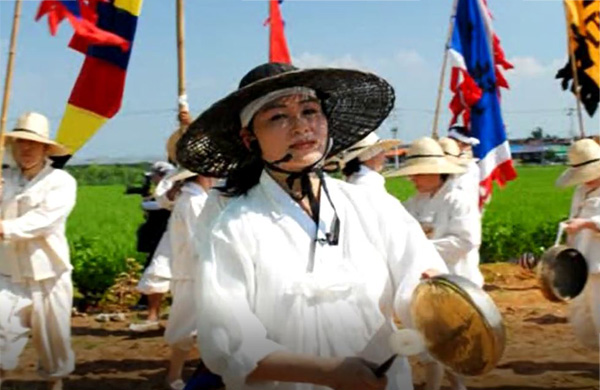Cultural heritage in Goyang
five-thousand years history
Current story of Goyang
In Beautiful Goyang-si, there are people who are designated as cultural property for their artistic value
‘Songpohomiguli,’ the folk game for wishing the bumper year and reward
(Gyeonggi intangible culture 22 | Date of designation : 1998.04.13 )

People tend to have a festival or party when they complete one specific and important task. As for farming, there are plays such as Chaekguri or similar parties. ‘Songpohomiguri’ (hoe hanging) is one of them. Hoe is called as ‘Homissiti.’ It was originated as people ‘cleaned and hung the hoe’ to be used for farming next year after they completed all the farming work in one year. Hoe hanging is also the party for thank how they were able to complete farming of the year. However, it is also the party for removing fatigue as farmers were both physically and mentally tired from farming while praising for bumper year. Songpo near Daehwa-dong in Goyang-si is the area for rice farming. Farmers’ cooperative group culture has been developed in this area that group unit play was frequently held. Hoe hanging was also one of such plays. When farming went well on July 7th
people commemorated it and held the play for hanging hoes to praise for bumper year. Songpohomiguri is proceeded in an order of Sangsanje, Daedonggosa, Daedong play, Yugaje, and after-party. Sangsanje was for residents in the village or representative of farmers’ cooperative group to wish for well-being in the village and praise the bumper year as a Confucian ritual. When the farmers’ cooperative group comes down from the mountain after Sangsanje, they proceed to Daedonggosa for praising the peace in the village. Then, they proceed Daedong play. There are several steps for Daedong play. Among them, play reaches to the peak in ‘Mudeung ride’ that people dance with ‘hoe hanging sound’ with cows as a background. After Daedong play, farmers’ cooperative group plays with Korean traditional percussion instruments wishing for the peace by visiting every house in the village and shares good words with them. Afterwards, residents in the village eat food and drink alcohol and play with Korean percussion instruments as an after-party to end Songpohomiguri. Songpohomiguri once suspended after 1931. There was a risk for it not to survive anymore. However, the late artist Hyungyu Kim who passed away in 2004 realized it in 1933 that Songpohomiguri started again and ended up being rewarded with outstanding prize in folk culture art competition in 1984. Afterwards, it was registered as Gyeonggi-do intangible cultural asset 22 in 1998. Afterwards, Songpohomiguri has been handed down up to present by Goyang Songpohomiguri preservation committee.